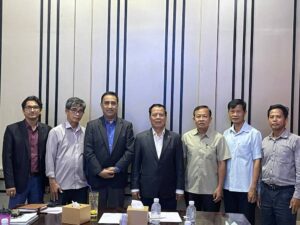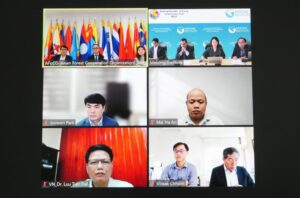Ensuring Safer Futures: The Legacy of MI’s PROSAFE Project
The commitment of MI and the New Zealand Aid Programme (NZAP) to promote a food safety culture in Cambodia, Lao PDR, Myanmar, and Vietnam (CLMV) traces back to 2015 with the inception of the Mekong Institute Food Safety Capability Activity (MIFSCA). This initiative aimed to deliver training and support services on food safety to local governments, small and medium enterprises, and research/academic institutions across these four countries.
In June 2018, the project entered its second phase, rebranded as PROSAFE: Promoting Safe Food for Everyone. This new phase sought to deepen technical support and expand regional and local capacity-building efforts in food safety through a coordinated approach to knowledge and skills development.
Throughout its duration, PROSAFE built upon the foundations laid by the initial phase. It provided a series of safe food courses to enhance food safety knowledge along the supply chain, engaged both public and private sectors, addressed specific training needs identified by each country, facilitated planned outreach efforts to apply acquired knowledge and skills, and leveraged expertise in food safety from New Zealand and the region.
PROSAFE emphasized the interconnectedness of food safety, economic prosperity, and public health resilience. The project aimed to mitigate economic vulnerabilities stemming from compromised food safety standards, recognizing the heavy toll foodborne illnesses take on human well-being and the economy. Through empowering government officials and private sector stakeholders with the necessary knowledge and skills, PROSAFE endeavored to foster a safer, more resilient food landscape across CLMV nations.
Ms. Maria Theresa Medialdia, PROSAFE Project Manager and Director of MI’s Agricultural Development and Commercialization Department, highlighted specific outcomes of PROSAFE, noting an increase in food safety knowledge and skills among relevant stakeholders in various stages of the agri-food supply chain. She emphasized the significance of capable trainers delivering food safety training in CLMV, foreseeing lasting effects as they continue to conduct training programs in their respective countries.
A notable achievement of PROSAFE was the development and implementation of 876 action plans by its alumni, leading to various outcomes such as organizing localized training courses, integrating food safety topics into academic curricula, updating government guidelines and regulations, and enhancing the operations of small and medium enterprises.
Throughout PROSAFE, 230 private firms, mostly SMEs, improved their food safety management systems and operations. Moreover, 42 government regulations and guidelines on food safety were developed across CLMV, and over 43 academic curricula for food safety and agricultural education were strengthened. The project also contributed to broader public awareness of food safety through 171 awareness-raising activities and the publication of food safety stories on various media platforms.
The culmination of PROSAFE was marked by a high-level meeting in Bangkok attended by stakeholders from CLMV. The event provided an opportunity to reflect on the project’s achievements, discuss future directions, and identify opportunities for sustained collaboration.
High-level officials attending the event included H.E. Mr. Sao Vannsereyvuth, Undersecretary of State and Chairman of the Cambodia CITES Management Authority; H.E. Mr. Sok Silo, Secretary-General of Cambodia’s Council for Agricultural and Rural Development; H.E. Mr. Phan Oun, Director-General of Cambodia’s Consumer Protection, Competition and Fraud Repression Directorate-General; H.E. Mr. Chan Sopha, Director-General of the Institute of Standards of Cambodia; Dr. Bounxou Keohavong, Director-General of Lao PDR’s Food and Drug Department; and Ms. Le Thi Phuong Thao, Deputy Director, National Institute of Food Control, Ministry of Health, Vietnam.
During the event, Mr. Suriyan Vichitlekarn, Executive Director of MI, emphasized the importance of food safety in the region’s sustainable development agenda. Dr. Narongchai Akrasanee, Chairman of the MI Steering Committee, underscored the necessity of addressing food safety challenges through relevant policies and capacity-building activities. New Zealand Ambassador to Thailand, Deputy Head of Mission, Ms. Abigail Poole, highlighted the beginning of a lasting legacy, emphasizing the commitment of CLMV’s public and private sectors to safer food practices and continued partnerships. Dr. Gyanendra Gongal, representing the WHO, emphasized the critical role of risk management and comprehensive food chain information in addressing food safety issues.
The event also saw the launch of a set of PROSAFE knowledge products meant to support food safety advocates in further advancing the food safety agenda in CLMV:
PROSAFE has made significant strides in enhancing food safety across CLMV. It has strengthened the integral role of food safety in the agricultural economies of CLMV and has embedded food safety practices at all stages of the value chain. With tangible and far-reaching outcomes achieved over five years, PROSAFE highlights the importance of investing time and resources in long-term projects. It underscores the need for sustained institutional support to ensure the lasting impact of such initiatives. As the project concludes, its legacy will continue to shape the region’s food safety agenda, ensuring safer and healthier food for all.





